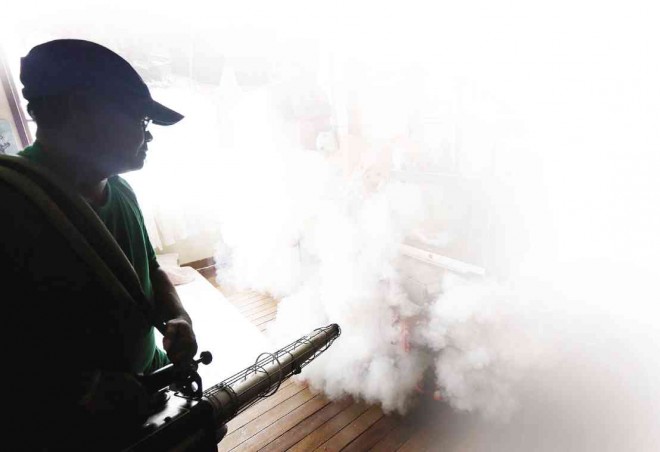
The increase in the number of dengue cases in many areas has prompted local governments, including those in Metro Manila, to conduct defogging missions in densely populated areas. MARIANNE BERMUDEZ
LINGAYEN, Pangasinan—The number of dengue fever cases in Pangasinan province has reached epidemic levels after more residents of the province were stricken ill by the mosquito-borne disease, their number jumping to 2,940 from 1,687 in just nine months, or an increase of 57 percent from last year’s figures, according to a health official.
The provincial health officer, Dr. Anna Maria Teresa de Guzman, however, declined to identify the areas that have been stricken by record numbers of dengue cases. She said she was leaving the declaration of an epidemic up to officials of the towns and villages.
The number of dengue cases in these areas in the last nine months, said De Guzman, had gone past the threshold for the declaration of an epidemic.
Whether a village or town has been hit by an epidemic is determined by computations of trends in dengue cases in the last five years, said De Guzman.
“We [in the provincial government] are not the one to [declare a state of calamity],” said De Guzman.
She said local officials would need to consult their constituents over a state of calamity declaration because it “may impact economically on the community” She did not elaborate, though.
She said provincial health officials have met with their village and town counterparts and leaders of the group of village officials, Liga ng mga Barangay, to discuss the spread of dengue. Village officials, she said, have been given maps that would help them “know where the dengue cases are coming from.”
Dengue has killed 12 people in Pangasinan this year. Last year, only five people died of the disease.
San Fabian town reported four deaths. The towns of Villasis, Agno, Infanta, Bugallon, Sta. Barbara, Sison and Bayambang and Dagupan City reported one fatality each.
The provincial health office has also put on a watch list nine towns and a city with the highest number of dengue cases. These are Alaminos City (404 cases) and the towns of Sison (164), Bolinao (158), Bani (151), San Fabian (126), Mangaldan (119), Asingan (107), Umingan (88), Anda (86) and Pozorrubio (83).
In Bulacan, Gov. Wilhelmino Sy-Alvarado said a state of calamity had been declared in the province due to a rise in the number of dengue cases that had killed 11 people.
The provincial board recommended the declaration of a state of calamity to open access to P39 million in calamity funds.
Of the 4,771 dengue cases recorded in Bulacan from January to September this year, 11 people had died, according to the provincial epidemiology surveillance unit.
Alvarado said the provincial government may subsidize the hospital and medication expenses of patients and put up dengue express lanes in hospitals in the province.
In the Cordillera, the number of dengue cases continues to rise, from 3,124 in August to 4,964 as of Sept. 19. Eight fatalities, including a 9-year-old child in Abra province, have been recorded this year. Mountain Province has the highest number of cases at 394. Gabriel Cardinoza and Jessica Tabilin, Inquirer Northern Luzon, and Carmela Reyes-Estrope and Ron Lopez, Inquirer Central Luzon/CDG
RELATED STORIES
Red Cross wants your blood for dengue patients
Bulacan declares state of calamity due to dengue deaths